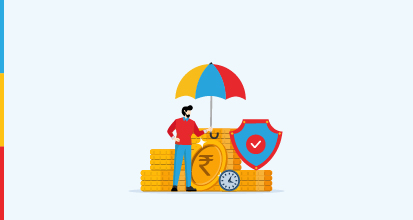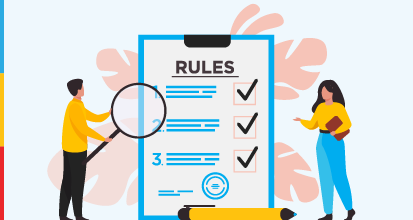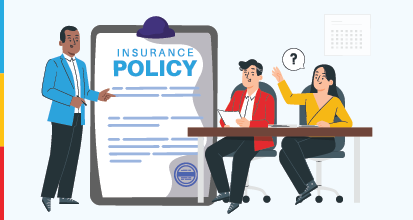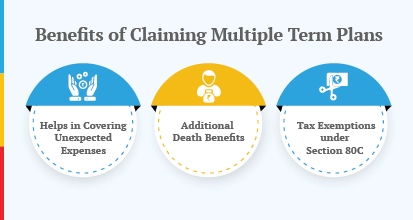- Short-term Disability Insurance: Provides income replacement for temporary disabilities, usually lasting up to two years.
- Long-term Disability Insurance: Offers extended coverage for permanent disabilities, often lasting till age 80 or lifetime.
- Premium Waiver Benefit: A feature where future premiums are waived if the insured suffers a permanent total disability.
Disability insurance is a type of life insurance policy that pays income benefits to the policyholder in case they are not able to work and earn an income due to a disability. The policy can financially protect you in case you become disabled due to an accident or a disease.
Learn more about different types of disability insurance.
A major disability can alter the shape and routine of your normal life. Whether accidental or stemming from an illness, a disability could mean any or all of the following:
- Loss of income due to job loss
- Home and vehicle upgradations
- Medical therapies for rehabilitation
Disability insurance cover will ensure that you have adequate financial support to sustain your life after such disabilities. It is a defined benefit plan that provides a fixed benefit amount if you encounter a disability.
The benefit amount may change based on the magnitude or severity of the disability. Usually, a 100% benefit amount is payable upon contracting permanent total disability. Permanent total disability refers to the loss of at least two limbs, for example, both hands, eyes, hearing in both ears, etc.
Disability insurance cover can help you take care of the costs related to therapy, home and vehicle makeovers, etc. to normalise your life after disability. The lump sum or regular income benefit from the insurance may also take care of your loss of income due to disability. Ensure that you choose the best disability insurance plan as per your needs.
Key Takeaways
|
Types of Disability Insurance
Disability insurance cover can help you take care of the costs related to therapy, home and vehicle makeovers, etc. to normalise your life after disability. The lump sum or regular income benefit from the insurance may also take care of your loss of income due to disability. Ensure that you choose the best disability insurance plan as per your needs.
Short-term Disability Insurance
Short-term disability insurance typically has a shorter duration for the cover. The policy term may last up to two years, and such short-term policies have a shorter waiting period of just 14 days.
Thus, these plans will be a lot cheaper. As a result, you can use them to protect yourself against the possibility of becoming disabled as a result of an accident or while undergoing treatment for a disease.
Long-term Disability Insurance
Long-term disability insurance, or permanent disability insurance, can last anywhere from up to 80 years of age, or even a lifetime. However, the usual waiting period ranges from 2 to 4 months.
When you choose disability cover with your standard term insurance plan, this is the disability cover you are opting for.
Get the Best Term Insurance Plan for Your Needs
Enter OTP
An OTP has been sent to your mobile number
Application Status
Name
Date of Birth
Plan Name
Status
Unclaimed Amount of the Policyholder as on
Name of the policy holder
Policy Holder NamePolicy No.
Policy NumberAddress of the Policyholder as per records
AddressUnclaimed Amount
Unclaimed Amount
Sorry ! No records Found
Request Registered
Thank You for submitting the response, will get back with you.
How Does Disability Insurance Policy Work?
Disability income insurance is a defined benefit insurance plan. Meaning, you can define the coverage amount under the plan at the time of purchase. Later, the policy will release this benefit amount in full or in part.
- Purchase & Premium Payment : You can buy disability insurance cover as a rider with a term life insurance plan or a health insurance plan. You will need to pay the premium for the disability cover along with the term life or health insurance cover.
- Accident or Critical Illness : If you happen to be in an accident or undergo critical illness treatment, you can inform the insurer. If you become disabled as a result of such events, you must file a claim. File the claim with the appropriate documents detailing the severity of your disability.
- Claim Payment : Disability claims are payable as per the type of disability cover you have opted for. You can have the following disability cover options:
- Premium Waiver Benefit : All future premiums for the life insurance cover are waived off for you upon contracting permanent total disability.
- Lump-Sum or Regular Income Pay Out : You receive a lump sum amount based on the severity of the permanent disability. The insurer may also pay the benefit as regular income if you have chosen the option.
- Both Pay Out and Premium Waiver : If you have chosen both options, both benefits will be available to you.
Eligibility Criteria for Disability Insurance
Eligibility for getting disability insurance is based on the following factors:
- Age : Minimum age is 18 and the maximum age for opting for the cover can go up to 70 years. While the minimum age will not go below 18, the maximum age ranges between 50 and 70 years between policies.
- Premium Paying Capacity : You should have an income to afford the premium.
A term insurance calculator is a useful online tool that helps you determine how much coverage you need based on your income, lifestyle, and family’s needs.
The above calculation and illustration of figures are indicative only and not on actual basis.
What does Disability Insurance Cover?
Disability insurance covers physical disabilities of different severities. Depending on the range of benefits, different disability insurance plans may cover any or all of the following disabilities:
- Short-term Disabilities: These are disabilities that make you completely bedridden for sometime leaving you unable to work. Disability insurance may provide weekly cash benefit to sustain your regular expenses while you recover.
- Partial but Permanent Disabilities: Partial but permanent disabilities refer to situations where permanent loss of limb or function of a sensory organ is a partial permanent disability. For partial disability, the policyholder may receive 50% or less depending on the severity of the disability.
- Total Permanent Disability: Such condition arises when the person loses the function of two or more limbs. For example, both hands or one hand and one leg, hearing in both ears, eyesight, etc. This cover is the most standard cover. For total permanent disability, the policyholder will get 100% of the benefit amount.
What is Not Covered in a Disability Insurance?
While disability insurance will cover disabilities arising from ailments or accidents, it does have a few exclusions. Here are the most important exclusions or factors not covered by disability insurance:
- Disabilities arising out of ailments, accidents, or injuries obtained within the exclusion period.
- Accidental injuries from adventure or sports activities, e.g., mountaineering, scuba diving, skydiving, etc.
- If you have an accident while flying an aircraft.
- If the injuries are self-inflicted or result from a suicide attempt.
- When you are injured while under the influence of alcohol or any other non-prescription narcotics or psychotropic drugs.
- Disabilities while operating for the armed forces, including paramilitary
- The insurance also does not cover injuries obtained in war, civil unrest, terrorism, etc.
- If you are injured while participating in a strike, industrial dispute, riots, or any illegal or criminal activity.
- If your injuries result from exposure to nuclear or biological radiation, reaction, or chemical contamination.
- If you are already physically handicapped or are dealing with a mentally unstable person.
The majority of exclusions point to the inert nature of the cover, which provides financial assistance for disabilities obtained in the normal course of life. The policy will specifically exclude extraordinary or self-inflicted injuries.
Advantages of Buying a Disability Insurance
- Financial Protection: Disability insurance offers a lump sum and regular income benefits to keep you afloat financially after disability.
- Focus on Recovery: You can focus on treatment and therapy to normalise your life instead of stressing about survival.
- Replaces Income Source: Weekly cash payments when you are bedridden are useful while you are recuperating from a major accident.
- Tax Savings: The premiums you pay are deductible from your taxable income under section 80D.
- Accidental Disability: The insurance policy protects you against unexpected disability.
Claim Settlement Process for Disability Insurance
The disability insurance claim process is similar to the health insurance claim process, with a few exceptions. The exceptions come into play when the claim is for permanent total disability related to voice, eyesight, or hearing
- Inform the Insurer: In any case, the first thing you have to do is to intimate the insurer as soon as possible after the accident or major illness diagnosis.
- Submit Documents: Submit all the mandatory and additional documents related to the claim:
- Claim form
- Original policy documents
- Bank attested NEFT mandate with a cancelled cheque or bank passbook.
- Photo identity proof of the policyholder
- Hospital certificates
- Clinical and laboratory reports
- Diagnosis Report
- Employment records
- A physician’s statement
- Claim Process Begins: The insurer will begin the claim process, which should be completed within 30 days of filing. However, you may need to submit additional documents if needed. With a few permanent disability claims, the monitoring period may stretch up to 12 months. So, the benefit payments related to the claim will be processed only after this period.
How to Choose the Right Disability Insurance Cover?
Disability is a rare but challenging event in life. So, you need to pay close attention to certain features, benefits, and terms of the policy while buying disability insurance. Here are the things you should consider:
- Coverage Amount: The disability cover should have enough sum assured to provide for your and your family’s regular survival expenses and the cost of therapies and modifications to your home and vehicle. At least 25% of your life cover should be good enough for that.
- Types of Disabilities Covered: Selecting disability insurance that covers the widest range of disabilities should be your aim. However, with the range, the premium cost will also increase. So, try to strike a balance between the two.
- Terms to Classify Disabilities: Insurance policies usually have very clear definitions of what is considered to be a disability and what is not. So, do check the policy contract to understand the definitions followed by the insurer.
- Exclusions: Despite the comprehensive nature of the cover, there are a few natural and legal exclusions to disability insurance. Before you assume anything, have a look at the exclusions section in the policy contract.
How to Buy Disability Insurance Policy?
You can buy disability insurance as a standalone policy or as a rider with your health insurance or life insurance plan. You can buy disability insurance online or offline, as per your convenience.
- Select the Type of Cover you Want: First, you need to decide if you want to buy a comprehensive standalone disability policy, short-term disability cover, or a disability rider. In the case of a disability rider, the next few steps will become redundant as you can only add the rider to your existing life or health insurance plans.
- Evaluate your Options: If you are buying a standalone disability cover or a separate short-term disability cover, you can start comparing the various options. All the disability plans have their information available online. So, gathering the basic information about the policies will be easy.
- Online or Offline: Next, you can decide if you want to buy the policy online or offline. While buying online, you can connect to customer care at anytime through chat or call and resolve your queries.
- Determine the Coverage Amount: Now that you have decided on the plan, select an adequate cover that will help sustain your life after the incident. Usually, 25 to 50% of your total life insurance amount is good enough for permanent and total disability cover.
- Submit the Application Form and Pay the Fee: Select all the necessary features and calculate the premium for disability insurance cover for yourself. Complete the application form and pay the standard premium. Make sure to provide all relevant details to the best of your knowledge.
- Go Through Medical Examination: Depending on your age and medical history, the insurer may ask you to go through a medical examination. Remember, if a medical condition is identified during the exam, your premium may increase. However, it also means that you need this insurance more than others. So, get the cover even at an increased premium, as the benefits will far outweigh the nominal premium rise.
Term Insurance - Top Selling Plans
Canara HSBC Life Insurance offers online term insurance plans to secure your family financially in your absence.
Family Shield: Enhanced Protection
- 3 Plan options
- Life cover till 99 years
- Steady income benefit
- Block your premium at inception
Start Young, Pay Less, Stay Secured
- Life cover till 99 years
- Coverage for spouse
- Block your premium rate
- Covers 40 critical illness
Family Shield: Enhanced Protection
- Affordable prices
- Multiple premium payment option
- Get Tax benefits
- Hassle-free purchase process
Things to Consider before Buying Disability Insurance
While disability insurance seems like a median cover lying between life and health insurance, you have a spectrum to consider. You can opt for a basic ATPD (accidental total and permanent disability) cover or a comprehensive one.
- Cover to Rehabilitate: The purpose of disability insurance should be to help you get back on your feet after a disability.
- Replace Lack of Income: Selecting disability insurance that covers the widest range of disabilities should be your aim. However, with the range, the premium cost will also increase. So, try to strike a balance between the two.
- Continue the Life Cover: Insurance policies usually have very clear definitions of what is considered to be a disability and what is not. So, do check the policy contract to understand the definitions followed by the insurer.
- Other Health Cover to Continue: Health insurance covers like Mediclaim and critical illness insurance should also continue. However, health insurance premiums may rise after the disability.
How Disability Insurance is Different from Optional In-Built Cover?
| Parameters | Disability Insurance | Optional In-Built Cover |
|---|---|---|
| Coverage | Covers disabilities from accidents as well as medical conditions, i.e., more comprehensive coverage | Covers only accidental disabilities |
| Term | Longer and independent of life insurance cover | Depends on the base policy term |
| Premium | Can be higher as it covers a wider range of conditions | Nominal and part of base life cover premium |
| Sum Assured | Select as per your needs | Limited as per the base life cover benefit |
Glossary


FAQs on Disability Insurance
Disability insurance cover improves your financial protection against unforeseen and unfortunate events. Disabilities can significantly change the way you live and work. Thus, a little assistance on the way is better while you recover medically and financially.
Disability insurance is only available to people who are considered medically fit. So, you may not be eligible for disability insurance if you have an existing disability. However, the insurance may cover a disability arising out of an accident or illness that occurred right before you bought the policy.
Usually, 25–50% of your total life cover amount should be adequate to support you in normalizing your life after a disability. But you may increase or decrease the amount based on your needs and affordability.
Usually, 25–50% of your total life cover amount should be adequate to support you in normalizing your life after a disability. But you may increase or decrease the amount based on your needs and affordability.
Yes, you should always check the claim settlement ratio and solvency of the insurer before buying the insurance. This will ensure that you or your nominees receive the insurance benefit when it is needed.
Related Blogs









Popular Searches on Term Insurance
- Types of Term Insurance
- Buy Term Insurance Online
- Term Insurance Plan
- 1 Crore Term Insurance
- 2 Crore Term Insurance
- 5 Crore Term Insurance
- Term Insurance for women
- Term Insurance Calculator
- Term Insurance for Housewives
- Term Insurance Tax Benefit
- Term Plan with Return of Premium
- 50 Lac Term Insurance
- Zero Cost Term Insurance
- Temporary Total Disability
- Buy Term Insurance Online
- What is Term Insurance?
- Term Insurance for NRIs
- 10 cr Term Insurance
- Term Insurance for Senior Citizens
- Spouse Term Insurance Plans
- Term Insurance for NRI
- Accidental Death Benefit



